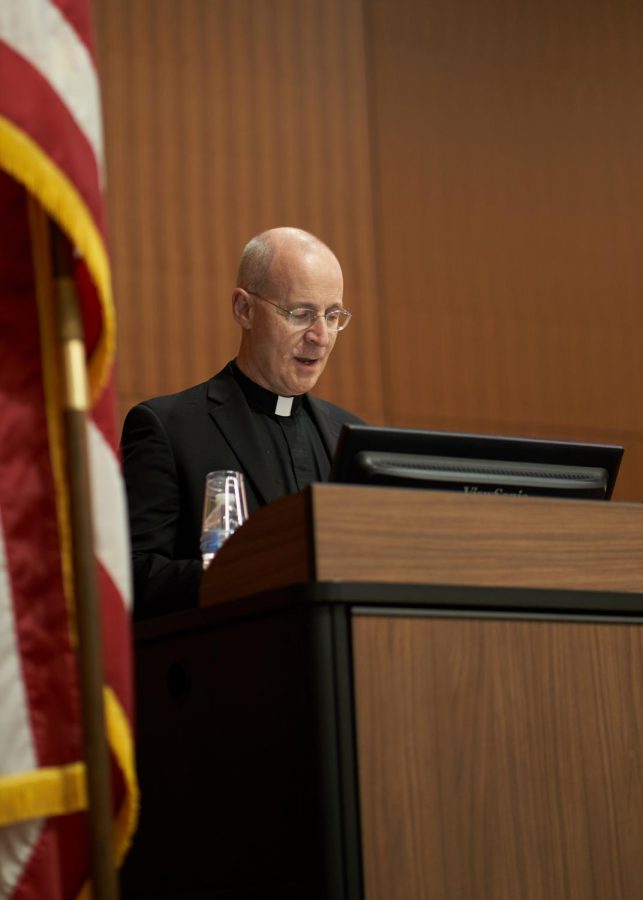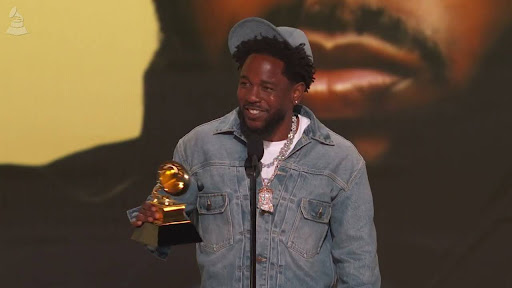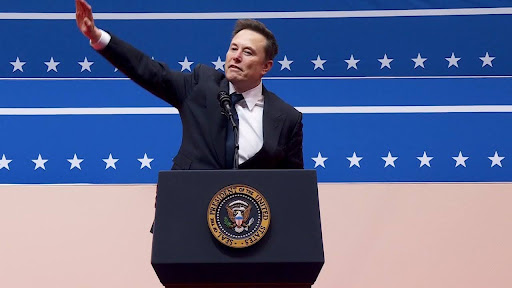A Catholic church is where the most holy, sacred and beautiful event takes place — the sacrifice of the Mass. It is when bread and water become the body and blood of Jesus Christ. It is nothing short of a miracle, and it is one of the central mysteries of the Catholic faith.
Imagine then, the outrage and disgust that Catholics would feel when their sacred space is defiled and used as a pulpit for hateful and divisive rhetoric. Imagine the necessary offense to be taken when their beliefs are ridiculed just feet away from the Tabernacle, where the body of Christ is housed.
Such was the case on Oct. 25, when the new chair of Vincentian Social Justice, Rev. William Barber II, was introduced to a hero’s welcome, as he gave his first of four lectures in St. Thomas More Church, entitled “America, America, What’s Going On? A Moral Critique.” What was called a moral critique was, in my eyes, a diatribe about the state of American politics, which involved a shallow call for unity at the end.
This would have been fine in the lens of a moral critique of America. The current state of politics is abysmal, and there is much to criticize.
It wasn’t that the speaker spoke tirelessly on the issue of racism. Racism is a true evil which divides people and it is rightfully called out as such. Although Barber may have stretched the theme at times, citing racism as the main driving force in politics and public policy since the dawn of this nation, his debate on its influence in American politics allowed for little recognition of the nuances that shape our world.
Any rational person, religious or otherwise, can and should acknowledge the stain of racism on the fabric of our world. Where Barber went wrong was asserting that opinions contrary to his own can be equated to, or are a result of, racism.
Barber urged unity against those who do not support “a woman’s right to choose” or who “hate gay people.”
Catholics, along with other religious traditions, maintain that abortion — the killing of an unborn child — is a grave evil. Furthermore, Catholics and other religions uphold marriage between one man and one woman, a sacred teaching that serves as the basis of a lifelong partnership. Barber mocked over 2,000 years of Church teaching, and called people who support these views “religious nationalists,” which he described as a dangerous force in America, and equated these positions with the evil of racism.
He said these things amidst a roar of praise from many present, including those who are supposedly meant to uphold the Catholic mission of the University.
Of course, had this lecture taken place outside of St. Thomas More Church, the material would have been the same. While its location is a great problem, the fact remains that it was a one-sided political speech. Shallow calls for unity were meant only for those who agreed with his position.
He used the classic “us versus them” language that presented his position as flawless, while labeling his opponents as backwards, racist and hateful. Reverend Barber’s words made clear his lack of knowledge of the people he was attacking, and a disrespect for the religion whose very place of worship he stood in.
Students of all creeds should be ashamed at St. John’s for inviting a speaker who derides the values of its mission. Catholic students should be particularly disappointed in the mockery of their beliefs in their sacred church.









Caitlyn • Aug 17, 2021 at 7:19 pm
Thank you so much for your article! You explained this very well
Marcus D Hyde • Dec 6, 2018 at 10:32 am
This article is amazingly shallow and meaningless. To not take seriously William Barber’s critique, because it challenges your own beliefs- is a disservice to yourself and your readers. A more reasonable catholic might recognize the places where his message is deeply inspired by the teachings of the church and reflective of the values in catholic social teaching. You might disagree with some points but writing off his message wholly makes you look intolerant and bigoted. Maybe religious nationalism is an appropriate term.
Jay Hedges • Dec 5, 2018 at 11:48 pm
Boiling down Rev. Barber’s talk to two points contrary to the official position of the Catholic Church (though nevertheless aligned with the beliefs of many Catholics) does a disservice to the dynamic critique and vision offered by Rev. Barber.
Rev. Barber provided a thorough historical-political analysis of the United States through a race- and class-based lens, while his “opponents” would prefer to obscure the legacy of race and class oppression in the U.S.
Rather than being “outrageous” and “disgusted” by Rev. Barber’s talk, many Catholics should recognize how his analysis reinforces a rich teaching tradition in the Catholic Church, from the Magnificat sung by Mary (Luke 1:46-55), to the preferential option for the poor promoted by Pope Francis and St. Romero, to the Bias from the Bottom taught by Fr. Richard Rohr.